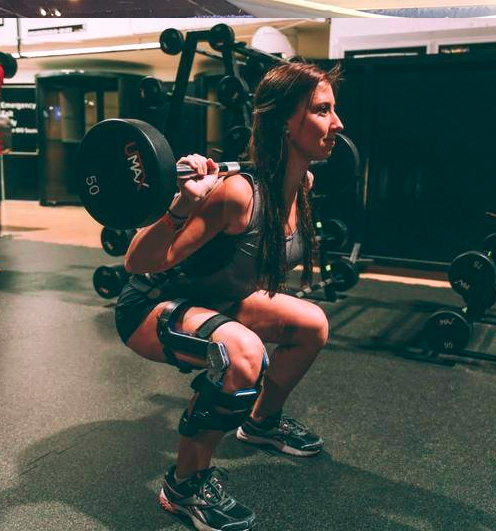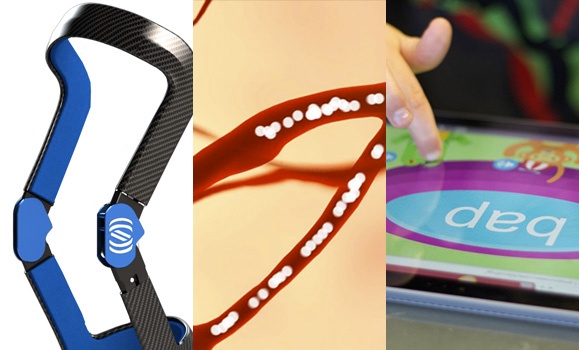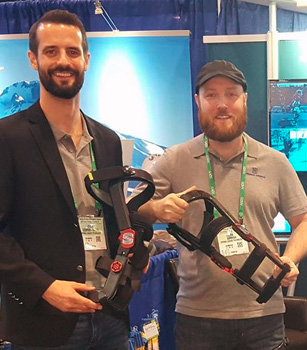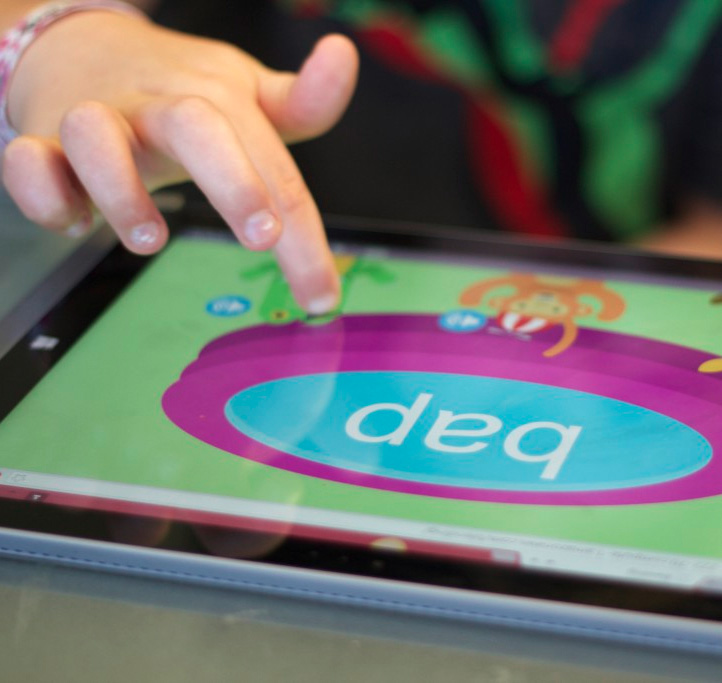DalhousieÔÇÖs crucial role in supporting entrepreneurship and innovation on CanadaÔÇÖs East Coast has grown in recent years. So, too, have some of the companies who credit the university for providing support along the way through student-focused programming (such as the course), entrepreneurship training for researchers, and a myriad of other affiliated initiatives.
We caught up with three emerging Halifax-based companies, all with significant Dal connections, to see where they are at developing their products and services.
Spring Loaded Technology
Dal connection: Emerged out of the inaugural offering of the in the fall of 2012.
The business: Spring Loaded has created a bionic knee brace called Levitation that enhances leg muscle power by, as the company describes it, ÔÇťstoring energy as you bend your leg and returning that energy as you straighten it out again.ÔÇŁ Lightweight and streamlined, the brace can be used for many different applications: to help increase strength and prevent injuries for workers and military personnel doing heavy lifting and crouching; to enhance performance in athletes by reducing fatigue during training; to improve mobility and rehabilitation for aging or injured individuals.
WhatÔÇÖs new? Spring Loaded proved thereÔÇÖs a market online for its unique brace that surpassed its $75,000 funding goal within 48 hours. Now, a month later, the three-year old startup's  campaign has just closed with $208,652 worth of pre-sales from 156 customers in 25 countries. The company plans to roll its product out in traditional retail stores over the coming year as well as production ramps up.
campaign has just closed with $208,652 worth of pre-sales from 156 customers in 25 countries. The company plans to roll its product out in traditional retail stores over the coming year as well as production ramps up.
Testing the e-commerce waters also helped the company clinch a $1.9-million investment from Build Ventures, a Halifax-based venture capital outfit. ÔÇťOnce we got to the stage where it was clear there would be good market uptake, they were prepared to make the investment,ÔÇŁ says Chris Cowper-Smith, Spring LoadedÔÇÖs co-founder and CEO, of the months-in-the-making deal announced Tuesday. He says theyÔÇÖll put the money towards manufacturing units, growing sales and building distribution channels in the months ahead. That same day, the company announced it had won a $1-million military contract with CanadaÔÇÖs Department of National Defence. The firm makes a heavier-duty version of its brace for the military sector, which Cowper-Smith calls a very promising market opportunity. ÔÇťYou can imagine foot soldiers, for example, are constantly crouching and standing back up during their tactical missions,ÔÇŁ he says. ÔÇťSimilarly, our braces can also be used for absorbing impact while youÔÇÖre wearing a heavy pack or when you are landing a para-trooping jump.ÔÇŁ
Website:
ABK Biomedical
Dal connection: Co-founded in early 2012 at Dal by interventional radiologist Bob Abraham, now CEO of the company, and materials scientists Daniel Boyd and Sharon Kehoe after a research discovery led to product development.
The business: ABK specializes is developing products that simplify and improve the treatment of tumours through procedures performed by interventional radiologists. ABKÔÇÖs first product, OccluRad, consists of small x-ray visible bio-compatible glass beads about the size of a grain of sand that are injected into arteries through a small catheter and physically cut off the blood supply to tumours such as liver or kidney cancer or uterine fibroids (benign, non-cancerous growths in the uterus that can cause significant bleeding and pain).
WhatÔÇÖs new? ABKÔÇÖs Dr. Abraham travelled to Silicon Valley in early February to attend Dose of the Valley, an invitation-only mentoring and networking event for Canadian startups in the biopharma, medical device and health IT sectors. ABK was one of two Halifax companies selected from across the country to participate in the meeting organized by CanadaÔÇÖs Business Development Corporation and C100, a non-profit that connects Canadian  entrepreneurs to influential Canadians in Silicon Valley to facilitate growth. ÔÇťItÔÇÖs that kind of networking that is key as we go forward. To meet people who can then knock on other peopleÔÇÖs doors to help us out,ÔÇŁ says Dr. Abraham (right), who was also paired up with a mentor with intimate knowledge of the U.S. life-sciences sector.
entrepreneurs to influential Canadians in Silicon Valley to facilitate growth. ÔÇťItÔÇÖs that kind of networking that is key as we go forward. To meet people who can then knock on other peopleÔÇÖs doors to help us out,ÔÇŁ says Dr. Abraham (right), who was also paired up with a mentor with intimate knowledge of the U.S. life-sciences sector.
Knowledge gleaned from those connections could prove handy in the coming months as ABK finalizes plans for an early 2017 rollout for OccluRad in Europe, Canada and the U.S. Dr. Abraham says the spinout (which has raised more than $3 million since inception) is aiming to close a new investment round in the near future, the proceeds of which will be used to build sales capacity ahead of those launches and to continue work on other products in its pipeline, such as a new radiation-emitting bead to be used for treating liver cancer. ÔÇťThe amount and pricing is yet to be determined, but our company is thankfully getting to that next stage where significant investment will allow us to bring product to the market and thereby make a difference in the treatment of these patients,ÔÇŁ he says.
Website:
Eyeread
Dal connection: Eyeread software developer David Sharpe graduated from Dal with a Mathematics degree last year. His two-year old startup was one of 10 chosen to participate in last summer.
╠ř
The business: Eyeread integrates reading assessments into simple gaming apps that help children learn to read during their crucial early years of school (from primary to grade two). Results gleaned from these tablet-based assessments, augmented by artificial intelligence, eye-tracking technology, and other multi-sensory inputs, are used to address each childÔÇÖs particular needs and improve literacy rates more broadly.
╠ř
WhatÔÇÖs new? Eyeread recently had the first of six planned reading-assessments apps approved by AppleÔÇÖs App Store with the endorsement of KidsSafe, an independent safety certification program designed exclusively for children-friendly websites and technologies. Now in closed beta testing, the app (Reading Ready with Ollie) is aimed at parents who want to determine if their children are ready to start reading. ItÔÇÖs due to be released in the coming weeks, with the other five modules in the suite launching thereafter. ÔÇťWhat we decided to do was release one at a time instead of waiting to release the whole full blown-out assessment,ÔÇŁ says Julia Rivard Dexter, a co-founder who recently joined the startup in a full-time capacity from web-development and innovation firm Norex. ÔÇťThis allows us to get feedback so that can influence later development to ensure it is the best possible game for kids and tool for parents.ÔÇŁ
╠ř
The startup has focussed on growing its partnerships as of late, too, recruiting the director of research at a reading research centre at Florida State University to help design some of the content for its programs. Rivard Dexter and co-founder Leah Skerry also competed and participated in an accelerator in San Francisco called Blackbox that hosted 13 globally focussed startups from around the world for a two-week accelerator that included everything from mentoring to pitching a room full of investors on the final night. ÔÇťWhere we are looking at a global product, it was good to get feedback from a global group,ÔÇŁ says Rivard Dexter, noting they worked alongside startups from Finland, Israel, Pakistan, India, Japan, and other countries. She says they returned from the event energized from an ÔÇťoutstandingÔÇŁ program that included talks from Silicon Valley stalwarts such as Pascal Finette, Robert Scoble and New York Times tech columnist John Marcov.
ÔÇťIn Silicon Valley, you get pushed to think bigger,ÔÇŁ she says. ÔÇťWe always think big, but they want you to be inspired to think even bigger.ÔÇŁ
Website:




